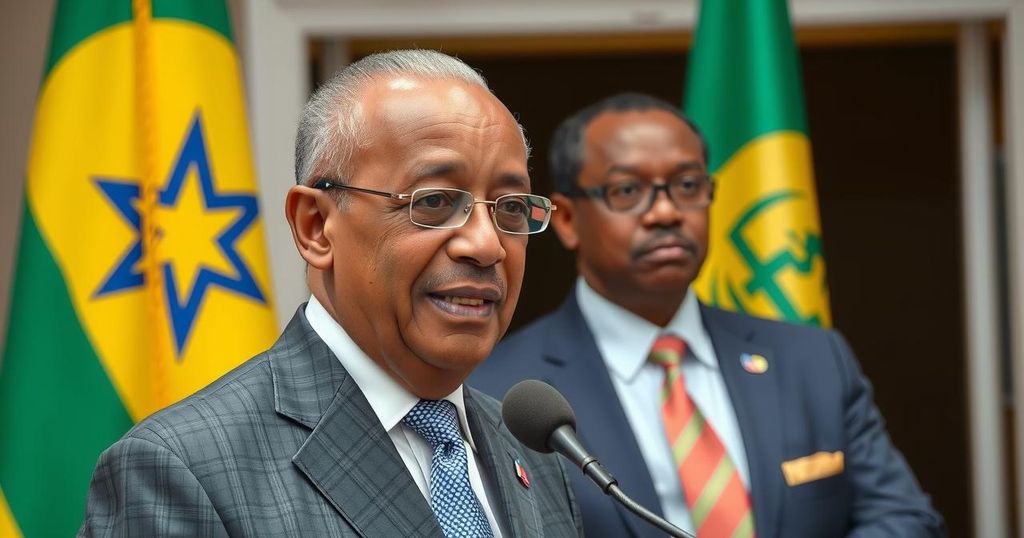Somali President Mohamud’s Diplomatic Visit to Ethiopia: A Step Towards Reconciliation

Somali President Hassan Sheikh Mohamud visited Ethiopia, enhancing bilateral relations following the Ankara Declaration aimed at resolving a territorial dispute. His welcome in Addis Ababa reflects an effort to strengthen cooperation and mutual respect between the two nations, which has been bolstered by increased trade and security collaborations in the region.
Somali President Hassan Sheikh Mohamud made a significant visit to Ethiopia’s capital, Addis Ababa, on Saturday, one month following a crucial agreement aimed at resolving a yearlong diplomatic rift between the two nations. Ethiopian Prime Minister Abiy Ahmed publicly welcomed President Mohamud at the airport, signaling an improvement in bilateral relations. In a statement from the Somali presidential office, it was noted that the discussions with Ethiopian leaders are intended to bolster cooperation and address shared priorities.
The recent diplomatic engagement stems from the “Ankara Declaration” signed on December 11, which followed escalating tensions over a maritime access agreement involving Ethiopia and the self-proclaimed Somaliland region. This accord, which permitted Ethiopia to lease 20 kilometers of seafront from Somaliland for 50 years, was rejected by Somalia, which termed it as a significant infringement upon its sovereignty. The Ankara Declaration, facilitated by Turkish President Recep Tayyip Erdogan, reaffirmed both nations’ commitments to respect each other’s territorial integrity and pursue mutually beneficial agreements.
During the visit, President Mohamud’s presence was highlighted with welcome messages displayed throughout Addis Ababa, where Somali and Ethiopian flags were prominently featured. This visit marks a pivotal moment for Mohamud, particularly as it follows a prior incident where he claimed he was obstructed from entering the African Union headquarters by Ethiopian security in February.
President Mohamud’s trip included prior engagements in Uganda, where he attended a summit focused on agricultural development and met with regional leaders. His trip underscores ongoing diplomatic efforts within East Africa, particularly his engagement with Kenya, which has noted a growth in trade relations with Somalia since its inclusion in the East African Community.
Both leaders emphasized the importance of regional stability, with Kenyan President William Ruto highlighting the increasing economic collaboration: “Our two countries are doing more business than before, with Somalia buying goods worth KSh5 billion [$38 million] in the first nine months of 2024.” This commitment to peace and security demonstrates a collective effort to foster a stable environment in Somalia while enhancing inter-state relations.
The recent visit of Somali President Hassan Sheikh Mohamud to Ethiopia underscores an important phase in the diplomatic relations between the two neighboring countries. Following the signing of the Ankara Declaration in December, both nations have been working to resolve tensions stemming from a maritime access agreement involving the region of Somaliland. The background of strained relations due to territorial disputes and the involvement of external actors like Turkey emphasizes the complexities of East African political dynamics. Historical grievances and recent diplomatic efforts shape the current context, highlighting the significance of Mohamud’s visit as a step towards fostering cooperation and stabilizing regional relations.
In conclusion, the visit of Somali President Hassan Sheikh Mohamud to Ethiopia symbolizes a pivotal moment in the ongoing efforts to mend relations strained over significant territorial issues. The Ankara Declaration has provided a framework for both nations to reaffirm their commitments to respect sovereignty and explore mutual cooperation. As Mohamud’s administration continues to engage with regional leaders, the focus on enhancing economic ties and ensuring stability within Somalia indicates a positive trajectory for East African diplomacy and regional collaboration.
Original Source: www.voanews.com








